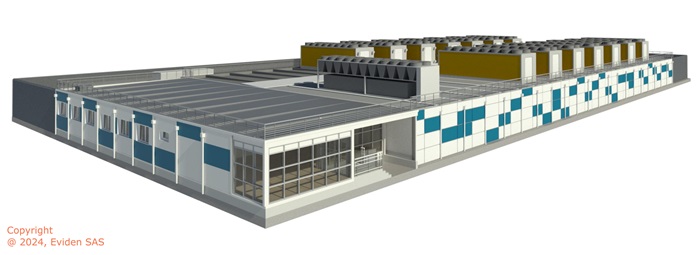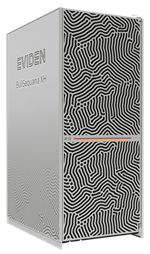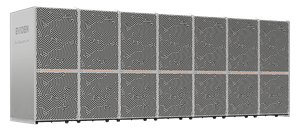Hosting the First European Exascale Supercomputer
[SPONSORED GUEST ARTICLE] As scientific and industrial computations become increasingly complex, the demand for immense computing power has skyrocketed. In the pursuit of the very first European Exascale supercomputing ambition, JUPITER (Joint Undertaking Pioneer for Innovative and Transformative Exascale Research) is blending the collaborative force of the European High Performance Computing Joint Undertaking (EuroHPC JU), the expertise of Jülich Supercomputing Centre, and the cutting-edge approach of Eviden. JUPITER is designed to tackle the most demanding simulations and compute-intensive AI applications in science and industry.
 Furthermore, the data center hosting JUPITER also needs to overcome additional challenges, such as regulatory rules, ecological considerations including energy efficiency, stringent resilience in case of issues, tight scheduling, and constrained budget from both a power equipment and construction material perspectives.
Furthermore, the data center hosting JUPITER also needs to overcome additional challenges, such as regulatory rules, ecological considerations including energy efficiency, stringent resilience in case of issues, tight scheduling, and constrained budget from both a power equipment and construction material perspectives.
Why Modular Data Centers Matter
Recognizing these challenges, the JUPITER project underscores the importance of innovative solutions, leading to the adoption of a modular data center approach. Modular data centers represent a paradigm shift in the way we conceive and build computing infrastructure. These solutions are constructed from pre-built, interchangeable modules, ranging from IT containers to power feed containers and logistics containers. They come together to form a comprehensive turnkey data center. The modular approach offers not only flexibility and agility but also facilitates smoother updates or replacements of individual modules, independent of the rest of the system.
Prof. Dr. Dr. Thomas Lippert, Director of the Jülich Supercomputing Centre, Forschungszentrum Jülich highlighted: “JUPITER will be perhaps the most powerful AI supercomputer in the world! Its modular computer architecture enables a particularly high level of energy efficiency. However, its enormous computing power comes with demands on the energy supply that no scientific data center in Germany has been able to meet so far. I am pleased that the modular data center will now allow for such a supply infrastructure to be created very quickly, which will also offer the possibility of using the thermal energy generated during cooling to heat the Jülich campus.”
Eviden’s Vision and Approach
Over the past 15 years, the company has designed and delivered solutions for deploying various modular data centers, with more than 100 operational modules in use globally. The Eviden factory in Angers, France, specializes in module integration and testing with incorporated IT equipment, playing a crucial role in ensuring efficient and reliable production processes.
Flexibility and Agility
Eviden’s approach, centered on the modular data center concept, incorporates around 50 pre-built modules, including IT containers for computing power, power feed containers for energy requirements logistics containers for supporting the data center with spare parts storage, workshops, and an integrated delivery facility.

This approach provides unparalleled flexibility, allowing for seamless updates or replacements of specific modules without causing disruptions to the overall system. This flexibility is particularly advantageous for JUPITER, as it seeks agile and adaptable data center solutions that can evolve with changing technological needs. The modular design promotes efficient scalability, enabling JUPITER to scale its computing power and energy capacity by adding or replacing modules as needed, thus avoiding the need for extensive overhauls or downtime.
Faster Deployment and Cost Reduction
The modular approach enhances the speed of deployment by leveraging pre-assembled modules the time required to set up a fully functional data center is significantly reduced. This expedited deployment is crucial for JUPITER which needs rapid access to computing resources without protracted construction timelines.
 Additionally, the modular design contributes to cost-effectiveness, JUPITER can optimize it’s investments by incrementally expanding or upgrading specific modules, aligning expenses with actual computing and energy needs. This contrasts with traditional data centers, where large-scale upgrades often entail substantial upfront costs. Compared to traditional ‘brick and mortar’ data centers, this innovative and flexible approach shows Eviden’s integration capabilities to deliver a full end-to-end HPC solution with costs cut by 3 and a delivery time reduced by 50%.
Additionally, the modular design contributes to cost-effectiveness, JUPITER can optimize it’s investments by incrementally expanding or upgrading specific modules, aligning expenses with actual computing and energy needs. This contrasts with traditional data centers, where large-scale upgrades often entail substantial upfront costs. Compared to traditional ‘brick and mortar’ data centers, this innovative and flexible approach shows Eviden’s integration capabilities to deliver a full end-to-end HPC solution with costs cut by 3 and a delivery time reduced by 50%.
Eco-Efficiency and Energy Consumption
The modular data center aligns with the growing emphasis on eco-efficiency in HPC systems. It blends Eviden’s best-in-class BullSequana XH3000 Direct Liquid-Cooled (DLC) architecture with adiabatic towers offering most of the time a free-cooling solution, despite JUPITER’s massive computing power.
In addition, the heat produced by JUPITER will be fed into Forschungszentrum Jülich’s existing heat reuse network. This heat reuse mechanism is also designed and built in a modular way enabling further expansion as needs grow.
No-Compromise Solution
Despite its swifter approach and its reduced TCO, the modular data center falls by no means short of a traditional DC:
- Power redundancy and resilience: a UPS for short-term outages as well as a generator ensure continuity of the feed, allowing in the worst cases – several hours without power -to at least save the ongoing calculations.
- Redundancy of water supply for cooling systems thanks to two sources: local river water and a backup from the public network
- Full water treatment, ensuring no toxins are released in the environment.
- State-of-the-art fire protection. Access control, intrusion detection and surveillance as well as technical management of the automated building.
Increasing Reliability through Eviden’s Manufacturing Facility in Angers, France
 Eviden’s factory in Angers, France, plays a crucial role in the manufacturing and integration process. The JUPITER HPC racks, cooling systems, power infrastructure, networking, and cabling are installed and tested directly on the factory floor. When the integrated modules reach the Forschungszentrum Jülich premises, the final setup is straightforward and much less issue prone. Therefore, this approach not only accelerates the installation process but also reduces the risk of potential issues upon customer delivery.
Eviden’s factory in Angers, France, plays a crucial role in the manufacturing and integration process. The JUPITER HPC racks, cooling systems, power infrastructure, networking, and cabling are installed and tested directly on the factory floor. When the integrated modules reach the Forschungszentrum Jülich premises, the final setup is straightforward and much less issue prone. Therefore, this approach not only accelerates the installation process but also reduces the risk of potential issues upon customer delivery.
Conclusion
Through this unique modular conception, Eviden will bring together a set of about 50 pre-built and interchangeable modules – amongst which are 20 IT containers, 15 power feed containers and 10 logistic containers (lobby, workshop, warehouse etc.) – over 2,300m² to form a complete turnkey data center.
As technology continues to advance, the collaborative efforts of EuroHPC JU, Jülich Supercomputing Centre and Eviden pave the way for a more sustainable, flexible, and efficient future in HPC. The modular data center approach for JUPITER is not just the debut of the first European Exascale supercomputer using an unconventional method; it signifies a pivotal moment in Europe’s pursuit of leadership in the global HPC landscape.
About the author:

Tanguy GIMENEZ, Project Manager Modular Data Center – HPC, AI & Quantum at Eviden. With a career spanning over 15 years with data center infrastructures Tanguy Gimenez now specializes in building modular scalable structures dedicated to high-performance computing. He has successfully led numerous projects, including the modular data center for CEA’s (French Commission for Atomic Energy) “EXA1 Supercomputer”, which is considered to date to be the largest modular data center ever installed in the world. Backed by a team of skilled team members, Tanguy is delighted to be taking part in the “EuroHPC JUPITER” project, which will be the first European system to reach 1 exaflop. For this project he is managing the team in charge of delivering Jülich Supercomputing Centre’s modular data center that will house JUPITER.





Speak Your Mind